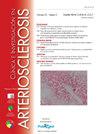inclisiran的疗效、获益和安全性。
IF 1.9
Q3 PERIPHERAL VASCULAR DISEASE
引用次数: 0
摘要
高胆固醇血症是导致动脉粥样硬化性心血管疾病(ASCVD)的一个原因,这是西班牙发病率和死亡率的主要原因之一。低密度脂蛋白胆固醇(LDL- c)的降低降低了ASCVD和不良心血管事件的风险。针对蛋白转化酶枯草素/克辛9型(PCSK-9)的靶向治疗已成为治疗高脂血症的新工具。Inclisiran是一种小的双链小干扰RNA,通过阻断肝细胞中PCSK-9的转录而起作用,导致循环LDL-C水平的显著和持续降低。与其他降脂疗法(如他汀类药物、依折替米和单克隆抗体PCSK-9抑制剂)相比,Inclisiran建议每年两次的罕见给药方案。它的长期效果比治疗的不依从性更有优势,这也是标准治疗不能达到LDL-C目标的主要原因之一。本综述旨在介绍和讨论目前有关Inclisiran治疗高胆固醇血症的有效性、耐受性和安全性的科学数据。研究显示,Inclisiran可长期显著降低LDL-C水平,同时显著降低PCSK9和其他致动脉粥样硬化脂蛋白水平,其副作用与安慰剂相似。一年两次给药方案的便利性促进了对治疗的坚持并促进了LDL-C目标的实现。正在进行的旨在确定其对心血管事件影响的试验结果有望提供有关inclisiran对ACVD患者和心血管高危患者心血管益处的进一步信息。本文章由计算机程序翻译,如有差异,请以英文原文为准。
Eficacia, beneficio y seguridad de inclisiran
Hypercholesterolemia is a causal factor of atherosclerotic cardiovascular disease (ASCVD), which is one of the main causes of morbidity and mortality in Spain. The reduction of LDL cholesterol (LDL-C) decreases the risk of ASCVD and adverse cardiovascular events. Targeted therapy for the proprotein convertase subtilisin/kexin type 9 (PCSK-9) has emerged as a novel tool for the treatment of hyperlipidemia. Inclisiran is a small double-stranded small interfering RNA that acts by blocking PCSK-9 transcription in hepatocytes, leading to a marked and sustained reduction in circulating LDL-C levels. In contrast to other lipid-lowering therapies such as statins, ezetimibe and monoclonal antibodies PCSK-9 inhibitors, Inclisiran proposes an infrequent dosing regimen of twice times a year. Its prolonged effect represents an advantage over non-compliance of the treatment, which is one of the main reasons why LDL-C goals are not achieved with standard therapy. This review aims to present and discuss current scientific data regarding the efficacy, tolerability and safety of Inclisiran in the treatment of hypercholesterolemia. Inclisiran has been shown to provide significant long-term reductions in LDL-C levels associated with notable decreases in levels of PCSK9 and other atherogenic lipoproteins with a highly favourable side effect profile similar to placebo. The convenience of a twice-yearly dosing regimen promotes adherence to therapy and facilitates achievement of LDL-C goals. Results from ongoing trials designed to determine its effect on cardiovascular events are expected to provide further information about the cardiovascular benefit of inclisiran in patients with ACVD and in patients at high cardiovascular risk.
求助全文
通过发布文献求助,成功后即可免费获取论文全文。
去求助
来源期刊

Clinica e Investigacion en Arteriosclerosis
PERIPHERAL VASCULAR DISEASE-
CiteScore
3.20
自引率
6.20%
发文量
44
审稿时长
40 days
期刊介绍:
La publicación idónea para acceder tanto a los últimos originales de investigación como a formación médica continuada sobre la arteriosclerosis y su etiología, epidemiología, fisiopatología, diagnóstico y tratamiento. Además, es la publicación oficial de la Sociedad Española de Arteriosclerosis.
 求助内容:
求助内容: 应助结果提醒方式:
应助结果提醒方式:


